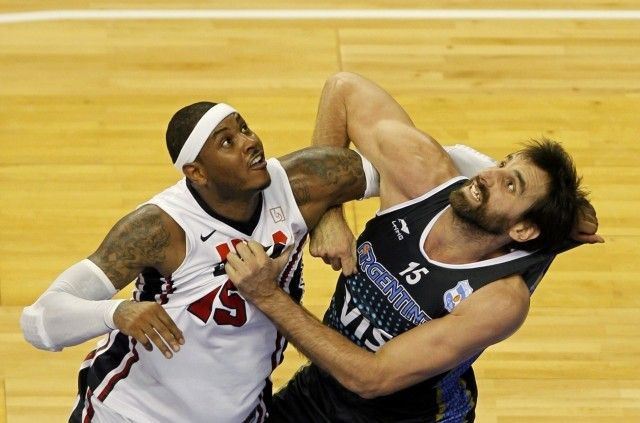NBA vs. Olympics Basketball: What Rules Must Team USA Adapt To At Rio 2016?

The United States men’s basketball team, the NBA “Super Team” formed by USA Basketball and head coach Mike Krzyzewski that no one has any problem with when the Olympics comes around, is widely expected to secure a third consecutive gold medal at the 2016 Rio Summer Games. Despite turnovers and poor three-point shooting the squad has looked solid overall in exhibition play before the Olympic tournament opens next month.
Team USA’s racked up three straight blowout wins over China (twice) and Argentina, and will likely produce the same results in Friday’s exhibition clash with Venezuela and the early stages of the official tournament.
But, when the games get tighter in the knockout rounds and formidable squads like Spain, France, and Canada are the opponents, mental mistakes and unfamiliarity with international rules could play a significant role.
Carmelo Anthony and Kevin Durant are the only holdovers from 2012’s gold medal-winning team, and four others as well as Durant (DeMar DeRozan, Klay Thompson, DeMarcus Cousins, and Kyrie Irving) all helped out during the World Cup run in 2014, but others like Chicago Bulls All-Star guard Jimmy Butler may need to adjust to the international game and calls.
Olympic basketball follows the rules set forth by FIBA (International Basketball Federation), and while Team USA’s been a dominant force the last two Summer Games, the rules are slightly different than the NBA’s,
Here’s the differences between FIBA and the NBA’s rules
Time
The games are still broken up into four quarters, but instead of 12 minutes in the NBA, the quarters are 10 minutes. However, the 24-second shot clock is exactly like the NBA’s.
Clock Stoppage
In the NBA, the clock can stop after a made field goal in the last minute of the first, second and third quarter, and the final two minutes of the fourth quarter and overtime periods.
In the Olympics, the clock only stops after a made field goal in the last two minutes of the fourth quarter and in overtime.
Fouls
In the NBA a team is in the penalty after six personal fouls, but FIBA and Olympic rules are a little more strict at five fouls. Going over the foul limit will afford any opponent two shots on the next foul, something Krzyzewski said he’s been trying to drill into this team.
“We’re constantly yelling out team fouls. That’s because the fifth foul is two free throws,” Krzyzewski said after the second exhibition win over China. “You can have guys out there not in foul trouble, but we’re in the bonus.
“Then you put a sub in, and he doesn’t have a foul, and then he fouls, and then all of a sudden they’re scoring without pressure on them.”
Going further, Team USA will have to be mindful of how much time they take at the free throw line. FIBA rules call for a five-second limit at the charity stripe, compared to 10 seconds at the NBA level.
Basket Interference
Here’s one rule difference that can favor the much more athletic Team USA. In Olympic and FIBA play a ball can be swatted away if its already on the rim or in the cylinder, whereas in the NBA any contact with the ball in such a situation would be called goaltending.
Timeouts
In FIBA action, only the coach call a timeout and only after the opposing team has scored or in a dead-ball situation, like a foul or turnover. In the NBA both players and coaches can call time outs.
Also, Olympic teams only get five one-minute time outs, compared to six in the NBA. FIBA says teams are allowed to use two time outs in the first half, three in the second half, and get only one in overtime. That could pose a problem if Team USA heads to overtime, because in the NBA teams are allowed to use as many as three time outs in overtime.
Lane Violations
There’s very little difference here, but in FIBA if a free throw is successful and any player, opponent or teammate, steps into the lane no violation is whistled. But if the shooter misses and an opponent steps into the lane another shot is rewarded, which is actually the same as the NBA.
However, in the NBA, if a shooter makes a free throw and a teammate has stepped into the lane before the shot is made then it doesn’t count.
© Copyright IBTimes 2024. All rights reserved.





















